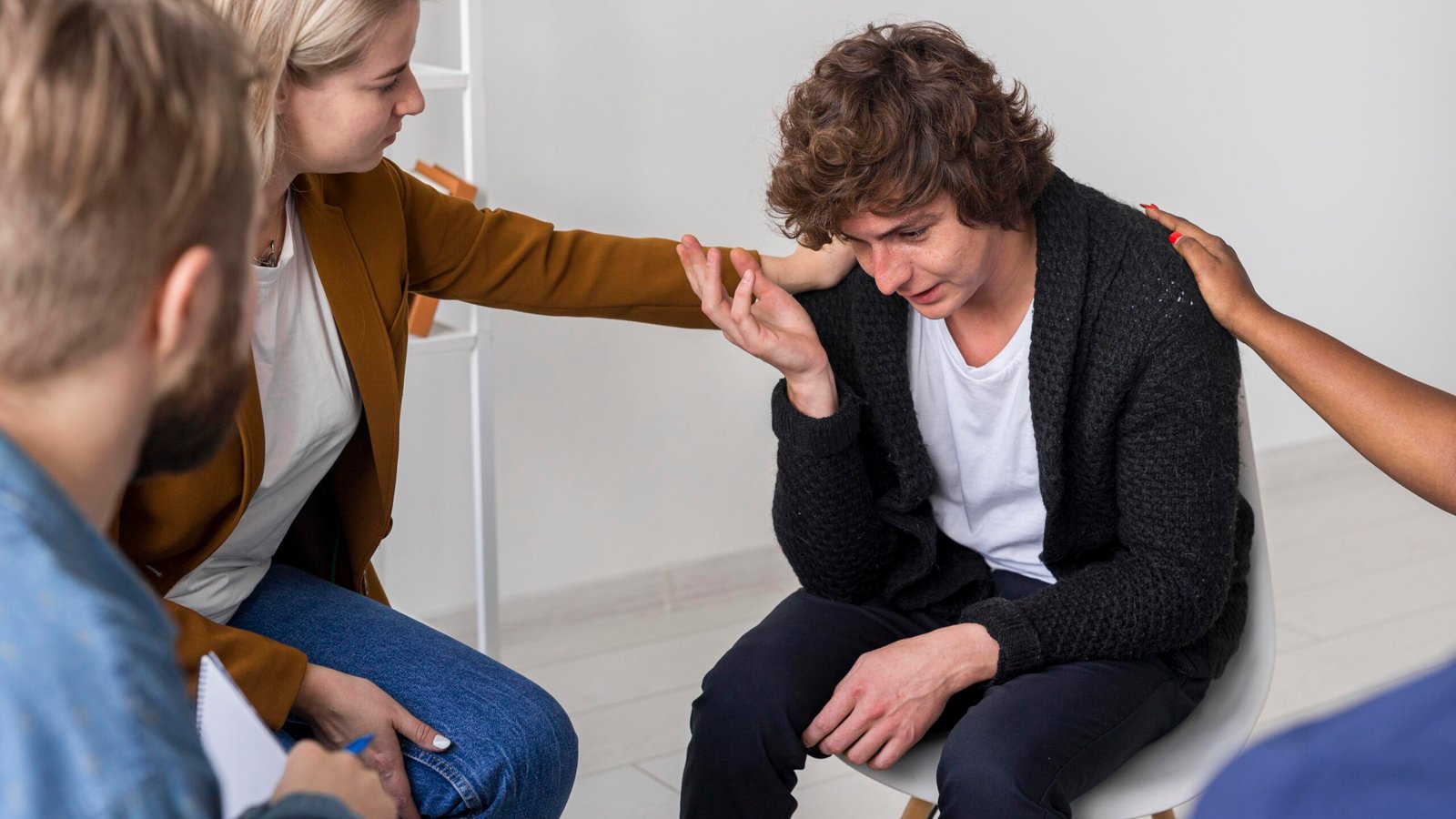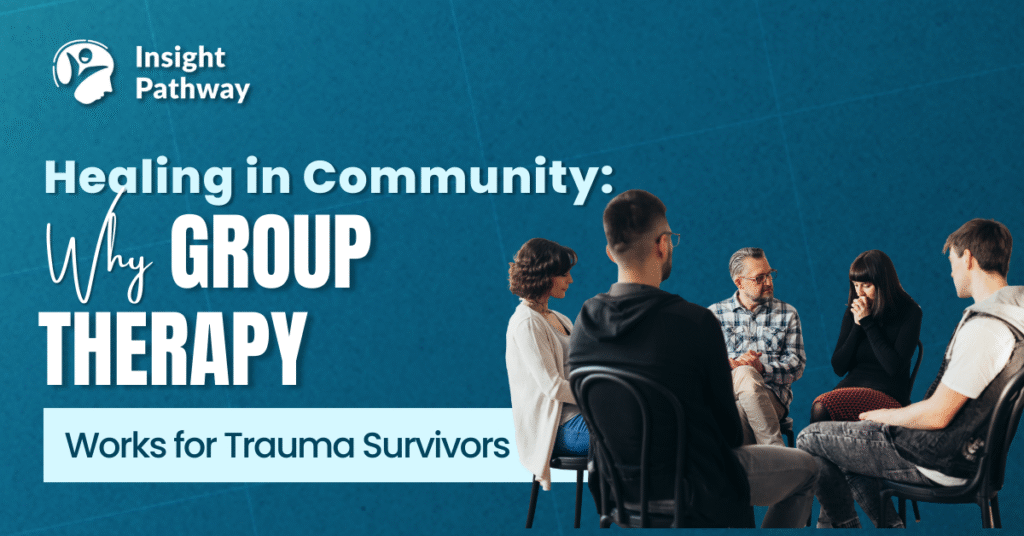Recovering from trauma can feel like a lonely and overwhelming journey. Many survivors struggle with isolation, shame, and the belief that no one else could possibly understand their pain. Yet one of the most effective paths to recovery is the opposite of isolation: group therapy for trauma survivors. By connecting with others who share similar experiences, survivors can find community, understanding, and the courage to rebuild their lives.
In this blog, we’ll explore how group therapy supports trauma recovery, the key benefits, and why healing in community can be just as powerful as one-on-one counselling.

What Makes Group Therapy Powerful for Trauma Recovery?
When people think of therapy, they often picture a quiet office and private conversations with a counsellor. While individual therapy has undeniable value, group therapy for trauma survivors offers something uniquely powerful: the shared experience of community healing.
In group settings, survivors quickly realize they are not alone in their struggles. Listening to others share similar challenges validates their feelings and reduces the stigma that often surrounds trauma. This collective recognition becomes a turning point in trauma recovery, helping individuals reframe their pain and begin to see a path toward resilience.
How Does Community Healing Support Trauma Survivors?
Shared Stories That Break Isolation
One of the heaviest burdens trauma survivors carry is loneliness. In a support group, sharing stories allows participants to release emotions they’ve been holding inside. Simply hearing “me too” can break the silence of isolation and open the door to connection.
Collective Healing vs. Individual Counselling
While individual counselling is private and tailored, community healing offers something equally essential,belonging. In a group, survivors learn from each other’s coping strategies, gain perspective from peers further along in recovery, and experience validation that even the best therapist cannot provide alone.
Together, collective healing fosters an environment of empathy, where members not only receive support but also offer it, reinforcing their own growth.
What Are the Benefits of Group Therapy for Trauma?
Many survivors wonder: What can group therapy offer me that I can’t get in individual sessions? The truth is, the benefits of group therapy are both emotional and practical.
- Emotional validation: Hearing others articulate feelings you’ve struggled with normalizes your experience.
- Reduced loneliness: Group settings counteract isolation by creating genuine human connection.
- Practical tools: Participants learn coping mechanisms directly from peers who understand trauma.
- Hope and inspiration: Witnessing others’ progress sparks confidence that recovery is possible.
These benefits make group therapy a cornerstone of effective trauma counselling.
The Science Behind Support Groups for Trauma Survivors
Scientific research continues to demonstrate the effectiveness of support groups for trauma in improving mental health recovery. Studies on PTSD, depression, and anxiety show that group interventions reduce symptoms, enhance coping skills, and improve overall well-being.
From a neurological perspective, shared experiences activate empathy through mirror neurons, helping survivors feel seen and understood. Group sessions also foster accountability, encouraging participants to remain consistent with their healing practices.
In short, mental health recovery is accelerated when survivors receive both professional guidance and peer support.
Who Can Benefit the Most From Group Therapy?
Trauma Survivors Across Many Experiences
While group therapy for trauma survivors is often associated with PTSD, it supports individuals from diverse backgrounds:
- Survivors of abuse or domestic violence
- Veterans and survivors of war or conflict
- People affected by accidents or natural disasters
- Those grieving significant loss
Mental Health Recovery for Isolated Individuals
Group therapy is especially powerful for survivors who feel disconnected from friends or family. Being part of a supportive environment creates belonging, which becomes a vital ingredient for trauma recovery.
Common Myths About Group Therapy (and the Truths)
Even though group therapy is widely recognized, misconceptions often stop people from joining. Let’s clear up a few:
- “I’ll be judged.” Reality: Groups are designed to be safe, confidential spaces. Members support one another without judgment.
- “I’ll have to share everything.” Reality: You set the pace. Survivors decide how much they want to disclose.
- “Group therapy isn’t effective.” Reality: Evidence shows group therapy works as effectively as individual trauma counselling for many survivors.
By addressing these myths, more people can access the healing power of collective recovery.
Practical Tips to Get Started with Group Therapy
If you’re considering joining a support group, here are steps to guide you:
- Research options. Many community centers, clinics, and online platforms offer trauma counselling groups.
- Ask questions. Inquire about the therapist’s experience, group size, and structure.
- Set realistic expectations. Healing takes time,give yourself permission to grow gradually.
- Stay open. Remember, group therapy is a shared journey. Listening is just as healing as speaking.
Taking the first step may feel intimidating, but it often becomes one of the most rewarding decisions in trauma recovery.
Healing Beyond the Group , Integrating Insights into Daily Life
What happens outside the group is just as important as what happens inside. Survivors are encouraged to:
- Journal after sessions to process insights.
- Practice coping skills in daily life.
- Combine group therapy with individual trauma counselling for a holistic approach.
Integration ensures the lessons from community healing extend into every area of life.
Is Group Therapy the Right Step for Your Healing Journey?
Many survivors ask themselves: Am I ready for group therapy? The truth is, there’s no perfect moment. If you’re searching for connection, validation, and support, group therapy could be the step that moves your trauma recovery forward.
Even if you feel hesitant, consider attending a trial session. Sometimes, the act of showing up is enough to spark change.
The Power of Healing Together
Healing from trauma is not a journey anyone should walk alone. While individual counselling is invaluable, group therapy for trauma survivors offers a unique path toward connection, resilience, and community. By sharing stories, exchanging coping strategies, and supporting one another, survivors discover that recovery is not only possible,it is stronger together.
If you or someone you love is navigating trauma, consider exploring support groups for trauma in your community. The first step may feel daunting, but within the group, healing becomes a collective experience.


